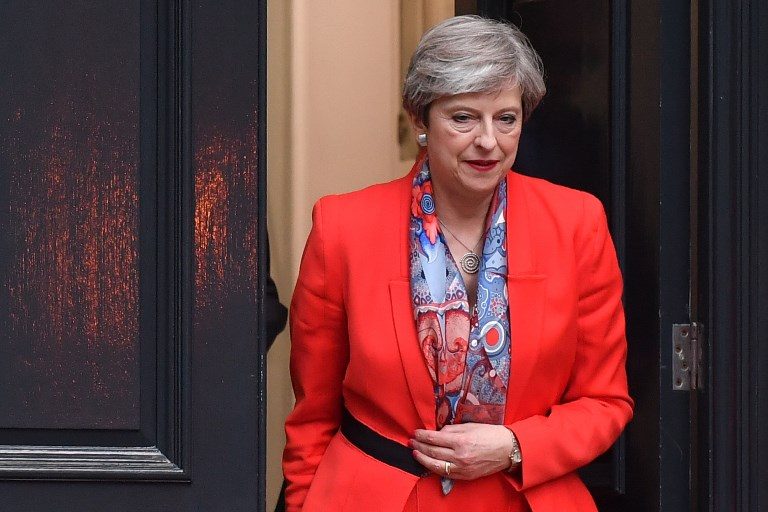SUMMARY
This is AI generated summarization, which may have errors. For context, always refer to the full article.

LONDON, United Kingdom (UPDATED) – British Prime Minister Theresa May failed to strike a government deal in an initial round of talks with Northern Ireland’s ultra-conservative DUP party on Tuesday, June 13, leaving the EU’s Brexit negotiator wondering when divorce talks would begin.
Days after May lost her parliamentary majority in a failed electoral gamble, the premier welcomed the leader of the Democratic Unionist Party to Downing Street in a bid to gain the support of its 10 MPs.
“Discussions are going well with the government and we hope soon to be able to bring this work to a successful conclusion,” the DUP’s Arlene Foster said after the meeting.
May left Downing Street without responding to reporters’ questions on whether an agreement had been reached with the DUP, which is needed to help the Conservatives command the majority they lost in last week’s election.
A DUP spokesman told AFP there had been a break in tasks due to parliamentary business. “Hopefully we can make a bit more progress today,” he said.
After the discussions May joined MPs in the House of Commons, where opposition Labour leader Jeremy Corbyn arrived to applause from his lawmakers.
“It is clear that our country faces some of the greatest challenges of our time,” she told parliament.
Corbyn warned against a “coalition of chaos” between the Conservatives and the DUP and said Labour was ready to provide “strong and stable leadership”, mocking two slogans used by May during the campaign.
The talks revolve around support from the DUP on a vote-by-vote basis in parliament, rather than a formal coalition government.
But the prospect of a deal has caused consternation in Dublin, with Ireland’s outgoing premier Enda Kenny warning that such an alliance could upset Northern Ireland’s fragile peace.
London’s neutrality is key to the delicate balance of power in Northern Ireland, which was once plagued by violence over Britain’s control of the province.
Former Conservative prime minister John Major has also raised doubts about the deal and its impact on the province’s “fragile” peace.
“The danger is that however much any government tries they will not be seen to be impartial if they are locked into a parliamentary deal at Westminster with one of the Northern Ireland parties,” he told BBC radio.
Brexit clock ticking
May has dismissed calls to resign following the dismal election result after calling a vote three years early, in the hope of bolstering her slim majority ahead of Brexit talks starting this month.
But a lackluster campaign saw her high approval rating slip away, and support for her “hard Brexit” strategy – pulling out of the European single market and customs union – now hangs in the balance.
As May attempts to cobble together a majority, the EU’s Michel Barnier said he would hold talks with British envoy Oliver Robbins on Tuesday to organize the negotiations.
“My preoccupation is that time is passing – it’s passing quicker than anyone believes… That’s why we’re ready to start very quickly. I can’t negotiate with myself,” Barnier, the EU’s Brexit negotiator, told European newspapers including The Financial Times.
With the two-year clock on Brexit ticking since March, when a letter from May formally started proceedings, Barnier dismissed the suggestion of postponing the negotiations and said such a delay would prompt only further instability.
The European Parliament’s Brexit negotiator, Guy Verhofstadt, also expressed his frustration.
“We are impatiently waiting for the negotiating position of the UK gov(ernment). The current uncertainty cannot continue,” he said on Twitter.
The EU meanwhile unveiled plans to give itself new powers over London’s banking business after Brexit, in what could be a blow to the city’s supremacy as a global financial hub.
The draft law would empower Europe to decide if post-Brexit London has the right to host financial market “clearing houses” that deal in euros, the EU’s single currency.
May heads to Paris
May will head to Paris later Tuesday to meet with French President Emmanuel Macron, who has just won an impressive victory in the first round of parliamentary elections.
A working dinner between the British premier and her Europhile counterpart – and a Brussels favorite – will be followed by their attendance at a friendly football match between England and France.
Colin Talbot, a professor of government at the University of Manchester, said the Paris trip was part of May’s strategy to improve her position at home.
“Going abroad and being seen to be the prime minister and talking to the president of France, being seen to be wheeler-dealing on the international stage, is a classic move to shore up authority at home,” he told Agence France-Presse.
Macron and May are also expected to discuss the need for closer cooperation at the European level to fight terrorism, which they discussed at the G7 in Italy and at a NATO summit in Brussels late last month.
The two are proposing penalties including fines against technology companies that fail to remove extremist content. – Rappler.com
Add a comment
How does this make you feel?
There are no comments yet. Add your comment to start the conversation.